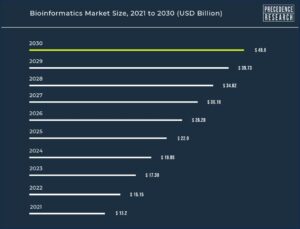Bioinformatics is one line of work that’s taking the job market in the United States by storm at present.
One report published in April 2022 by Globe Newswire goes on to state that the rising demand of bioinformatics tools is estimated to drive the market to over US$ 34.7 Billion by 2030. The same report also points out that North America will continue to dominate the global bioinformatics market in the forecast period.

While this is good news for bioinformatics candidates who are trying to make a promising career in the field, it also implies they’ll have to attract the best employers and show them how they stand out from the competition.
Below, we highlight a few in demand bioinformatics skills that can help you ace your interview and land the job of your dreams!
1) Statistical Analysis
We all know that statistical concepts and techniques form an integral part of any bioinformatics jobs. Therefore, it should come as no surprise that this is one of the most important skills hiring managers look for in potential recruits.
Being familiar with various elements of statistical analysis such as probability, distribution curves, standard deviation, variance, etc. adds up to make your resume stronger and helps place you in a better position than your counterparts.
Job interviews within the bioinformatics niche also revolve around testing your knowledge in these areas because that is how employers assess if you can effectively collect, organize, analyze, interpret, and present data to find useful results.
The ability to perform statistical analysis with tools like Python and R, as well as knowledge of statistical software systems like SPSS and SAS will take you a long way in landing the bioinformatics role you’ve been eyeing.
2) Basic Understanding of Coding and Programming
When you’re trying to get employed for a bioinformatics role, a lot of companies expect you to have some understanding of coding and programming.
Now, you don’t need to be a code master or essentially have a degree in Computer Science, but it helps to know the basics of writing code.
“Previously, scientists and companies used to look at bioinformatics as a tool,” says Wim Van Criekinge, a professor of bioinformatics at Ghent University in Belgium, in one article published on the science.org website.
“Bioinformaticists would be called upon to answer a question about data; their role was to run an algorithm on a database that provided that answer. But the subject has evolved from a service, like histology, to its own research arena…. Bioinformaticists are now the motor of the innovation. They not only answer the data inquiries, but also, more importantly, determine what questions need to be asked in the first place,” Criekinge adds.
If you want to land a good job with a good company, it is important that you learn commonly used programming languages, some of which include:
- Python
- R
- Perl
- C/C++
- Java
3) Knowledge of Commonly Used Bioinformatics Tools
The understanding of how biological systems (and their related components) work is at the apex of bioinformatics. This is why knowledge of commonly used bioinformatics tools that help with better understanding these systems is an important skill to have on your resume.
A few such tools include:
- Next-generation sequencing (NGS), also referred to as high-throughput sequencing. An umbrella term describing various sequencing technologies that allow for faster sequencing of DNA and RNA
- Sequence analysis tools – Blast, Clustal, Bowtie, etc.
4) Machine Learning Techniques
Machine learning (ML) belongs to the branch of computer science that provides self-learning capability to machines without explicit programming.
Today, various ML algorithms are being extensively used tasks to perform tasks such as prediction, classification, and feature selection in bioinformatics. It’s one of the most in-demand skills any bioinformatics candidate can have right now!
Therefore, having basic understanding of, or some amount of prior experience with machine learning algorithms and techniques can considerably increase your chances of being discovered by good companies.
5) General Soft Skills
Honing general soft skills can take any candidate a long way in landing the job of their dreams.
In fact, research conducted by Harvard University, the Carnegie Foundation and Stanford Research Center has all concluded that 85% of job success comes from having well‐developed soft and people skills.
So then, what soft skills should you focus on developing?
- Enthusiasm and attitude: Without being over-the-top in your job interview, a dose of enthusiasm and passion for the role can make you stand out from other candidates. It’s important to demonstrate to employers you are keen right from the early stages of interviewing, and that you’ll carry this same enthusiasm through to the workplace if you’re the chosen applicant.
- Communication: Strong communication is essential in any bioinformatics role, in one way or another. With this in mind, being able to confidently communicate your points during a job interview will impress your interviewer. Add to this active listening and responding with well-prepared responses means you have strong abilities in engaging in two-way communication, not just one-way.
- Problem-solving: Many roles involve a level of problem-solving and lateral thinking, and often this needs to be done independently with little help from your peers or manager. Prepare several examples of your best problem-solving experiences before your interview. This could include times when you’ve developed a methodology for doing something, or scenarios when you thought outside the box to find a solution, known as critical thinking.
- Leadership and initiative: Contrary to what you might think, you don’t have to be in a management position to show leadership skills. These skills can simply be something like stepping up during a meeting to contribute ideas, taking initiative to get something done, or being the one that people turn to in the team for advice when times get tough.
To learn more about bioinformatics skills in demand, and what you can do to interview more effectively and impress hiring managers within no time to land multiple job offers, get in touch with us at BenchPoint today – leading healthcare IT recruiters!
We’ll be happy to guide you with the smallest queries you have, and help you build a strong and impressive candidate profile in the process of doing so.
